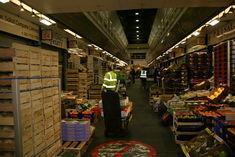
The cost of plans for the redevelopment of New Covent Garden Market undermined a steady year for the Covent Garden Market Authority (CGMA).
CGMA’s operating profit was down after absorbing the feasibility costs associated with the project and it made a loss before tax of £2.7 million in the year to 31 March, compared to a £970,000 loss the previous year, in line with forecast expectations.
Operating profit before the £4.2m feasibility study ran to £1.5m in 2011, down from £2.2m the previous year, according to the CGMA’s 50th annual report and accounts.
The total market trade is worth £560m. Fresh produce wholesale distribution accounts for the largest share of trade at £176m (a 31 per cent share), followed by fresh produce wholesale at £148m, importing (£109m), other food company trade (£79m) and flower sales (£47.8m).
The association said occupancy by fresh produce companies slipped three per cent to 89 per cent but the flower market saw considerable consolidation of businesses following the lease renewal process in March 2010.
CGMA CEO Jan Lloyd said: “Many of the businesses in this area were extremely small and a number of owners decided to retire. The layout of the flower market hall makes it is difficult to use areas for alternative or complementary uses. Nevertheless, it is encouraging that a number of contract florists are expressing interest in the perimeter units.”
CGMA chief executive Jan Lloyd said: “Many of the businesses in this area were extremely small and a number of owners decided to retire. The layout of the flower market hall makes it is difficult to use areas for alternative or complementary uses. Nevertheless it is encouraging that a number of contract florists are expressing interest in the perimeter units.”
In the plans for the new market, space is to be made available in proportion to the trends and demand from the different sectors.
The number of companies in the market has gone down in the year to 204 from 231 in 2009-10. However, some of this decline is explained by consolidation, with smaller companies merging with larger operators.
In the year, 42 companies left the market as a whole, 15 new businesses became tenants and 11 existing tenants took on additional space.
At the end of March 2010 the majority of leases on the site came up for renewal and most reached agreement but a number of tenants initially declined to sign the new lease, seeking to challenge the landlord’s break clause. Lengthy discussion on the matter were concluded by the end of March this year.
These renewed leases are for ten years with a rent review in 2015 and a one-off tenant break clause also in 2015. In addition there is a landlord break clause in 2012.
“We have an extremely exciting and challenging future ahead of us. I know that together we can achieve our vision of being the focus for food and flowers in London but with a modern market, fit for our tenants.” Lloyd added.



